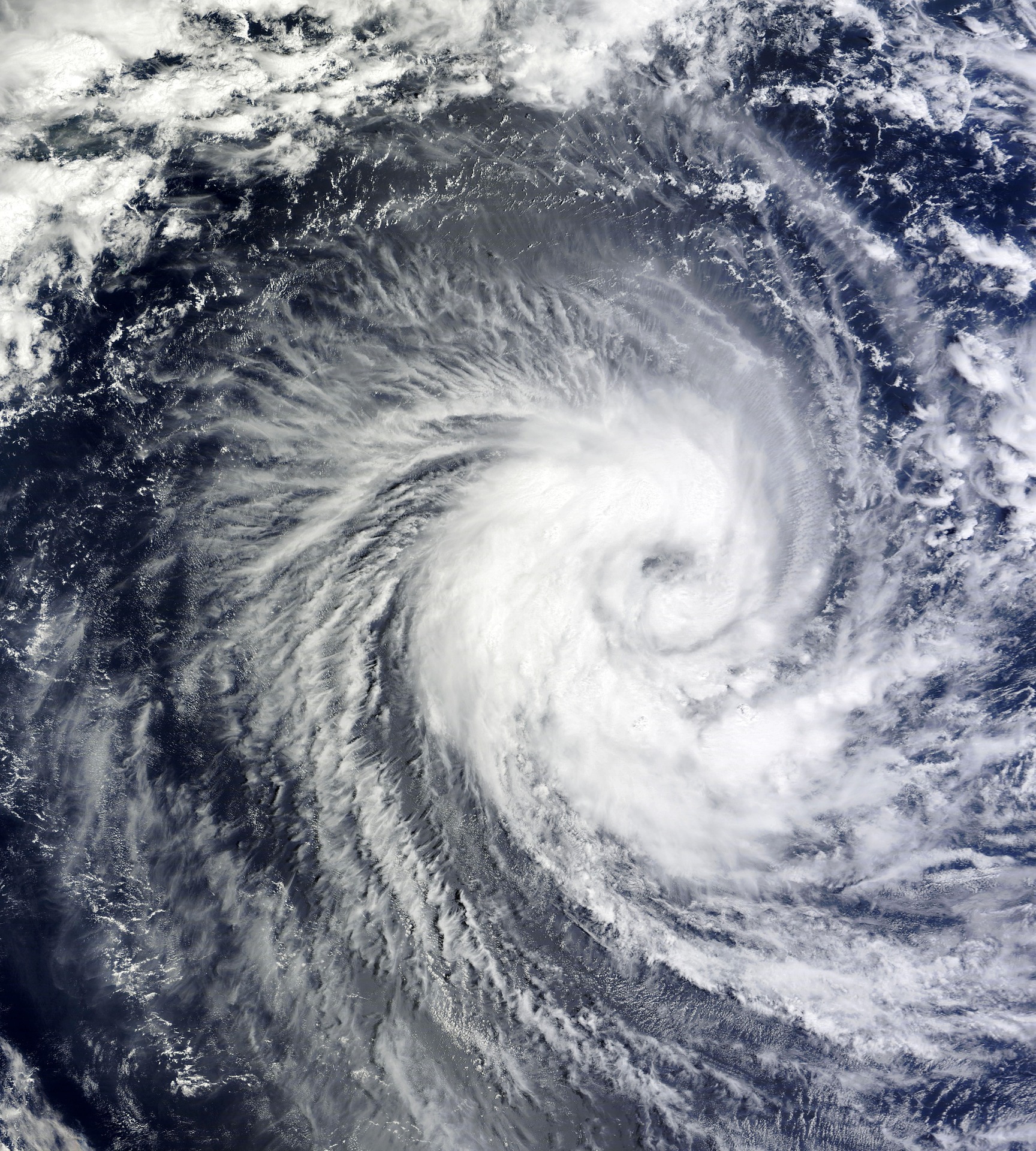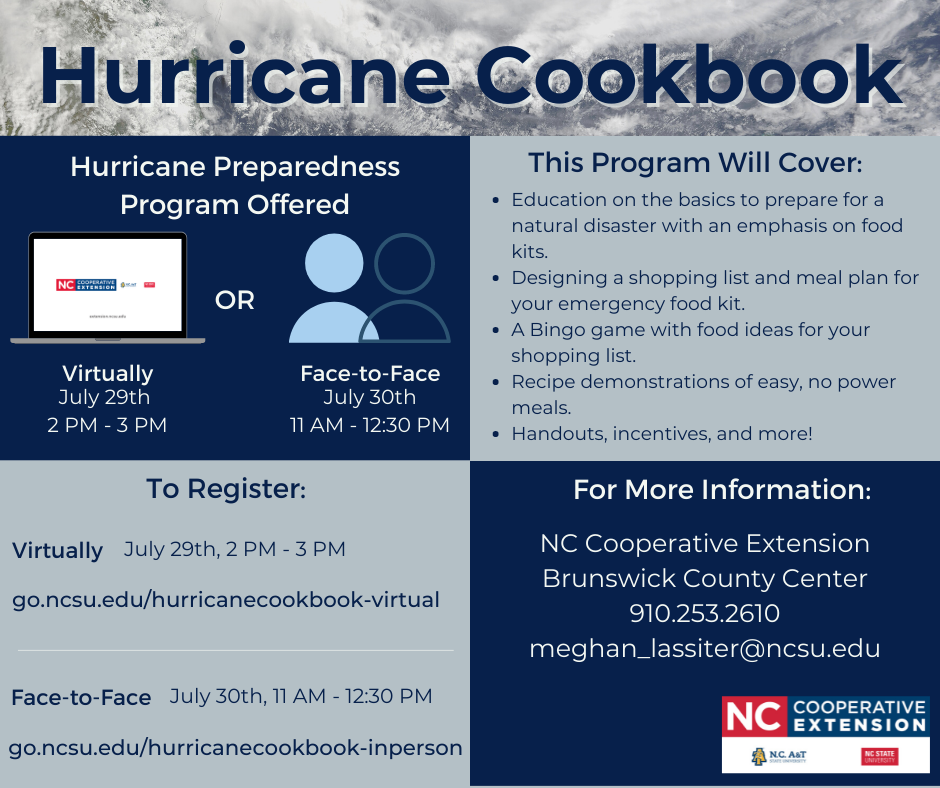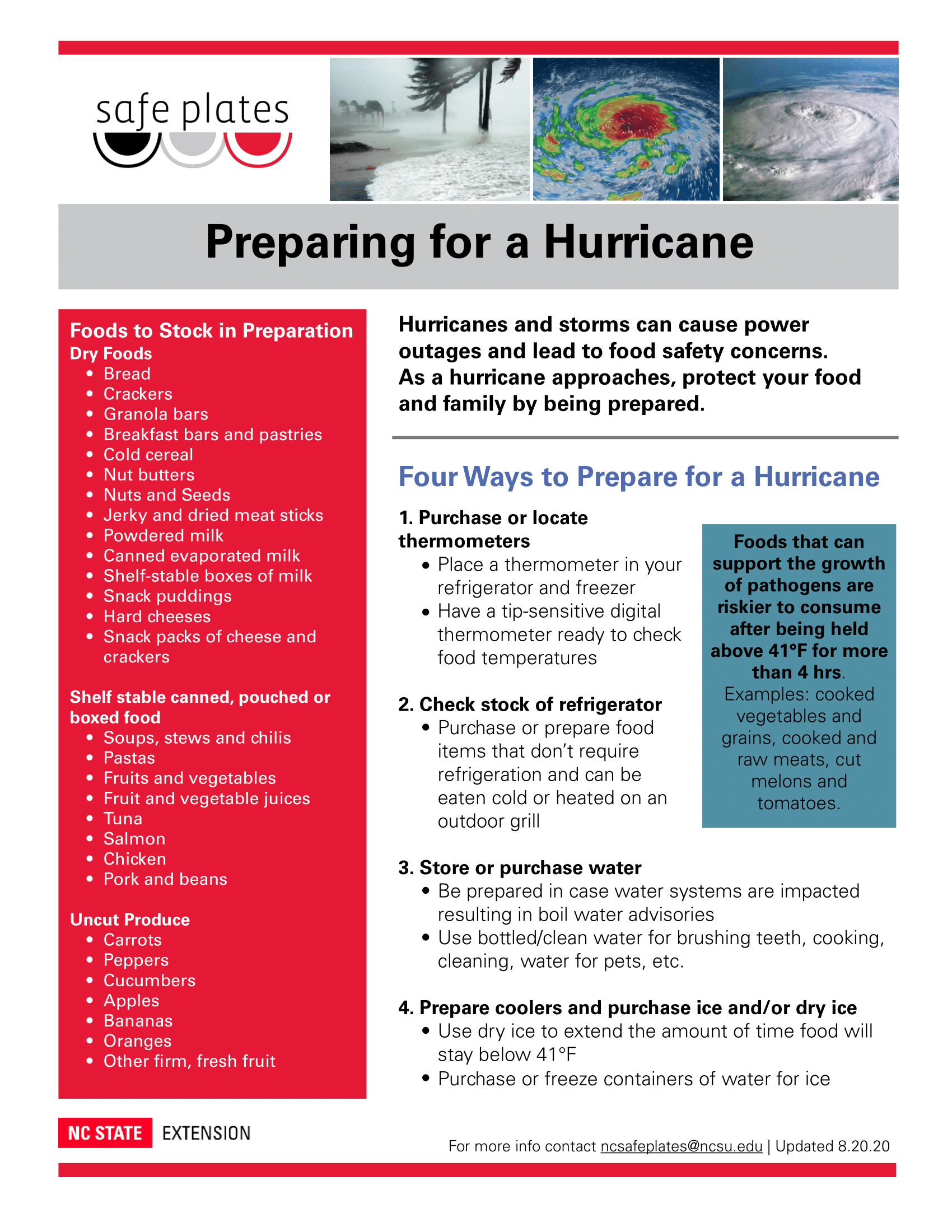Prepare a Nutritious Food Kit—Before a Hurricane Hits!
go.ncsu.edu/readext?810109
en Español / em Português
El inglés es el idioma de control de esta página. En la medida en que haya algún conflicto entre la traducción al inglés y la traducción, el inglés prevalece.
Al hacer clic en el enlace de traducción se activa un servicio de traducción gratuito para convertir la página al español. Al igual que con cualquier traducción por Internet, la conversión no es sensible al contexto y puede que no traduzca el texto en su significado original. NC State Extension no garantiza la exactitud del texto traducido. Por favor, tenga en cuenta que algunas aplicaciones y/o servicios pueden no funcionar como se espera cuando se traducen.
Português
Inglês é o idioma de controle desta página. Na medida que haja algum conflito entre o texto original em Inglês e a tradução, o Inglês prevalece.
Ao clicar no link de tradução, um serviço gratuito de tradução será ativado para converter a página para o Português. Como em qualquer tradução pela internet, a conversão não é sensivel ao contexto e pode não ocorrer a tradução para o significado orginal. O serviço de Extensão da Carolina do Norte (NC State Extension) não garante a exatidão do texto traduzido. Por favor, observe que algumas funções ou serviços podem não funcionar como esperado após a tradução.
English
English is the controlling language of this page. To the extent there is any conflict between the English text and the translation, English controls.
Clicking on the translation link activates a free translation service to convert the page to Spanish. As with any Internet translation, the conversion is not context-sensitive and may not translate the text to its original meaning. NC State Extension does not guarantee the accuracy of the translated text. Please note that some applications and/or services may not function as expected when translated.
Collapse ▲Hurricane Cookbook with Health Hacks
Well, we certainly lucked out with Elsa a couple of weeks ago. I hope that you were prepared, just in case. Or if not, I hope she inspired you to think ahead to get those hurricane kits made and have some plans in place.

We had it scheduled before Elsa, so it was just a coincidence, but last week my colleague Meghan Lassiter and I presented a class called the Hurricane Cookbook as the July Health Hacks for the Brunswick Wellness Coalition.
During this class, we encouraged participants to make a Hurricane Food Kit. There are lots of lists out there that tell you what to put in your emergency kit. However, when it comes to food, they usually just say to have a supply of shelf-stable food. Our class focused on what these foods might be. Being prepared and having a plan can really help reduce your stress and anxiety during an emergency.
Quite often the food people eat during a hurricane is randomly picked up at the last minute at the closest store. Usually, very little thought is really given to how these foods will be eaten, meal planning, or nutrition for three daily meals. The Hurricane Cookbook class offered some strategies for types and quantities of food to purchase as well and menu ideas and recipes using shelf-stable, nutrient-dense food.
Safe Plates Tips
The NC State Extension Safe Plates Information Center has some suggestions for foods to put in this kit. When building a kit, consider the different food groups and how these food items could go together into a meal.
- Dry foods: Whole grain crackers, granola bars, cereals, nut butters, nuts and seeds, jerky and dried meat sticks, powdered milk, canned evaporated milk, shelf-stable boxes of milk, snack puddings, and hard cheeses.
- Shelf-stable canned, pouches, or boxed foods: tuna, salmon, chicken, soups, fruits and vegetables, and fruit juices.
- Uncut produce – carrots, peppers, cucumbers, apples, bananas, and oranges. These items can be purchased during your last trip to the store before the storm
hits. They do not need to be refrigerated unless cut or heated.
Upcoming Program
 We have several months left in this year’s hurricane season, so it’s not too late to build your own Hurricane Food Kit. If you’d like more information, plan to attend one of our two Hurricane Cookbook classes coming up this month. There will be a virtual class on Thursday, July 29, 2021, from 2 until 3 p.m. We’re also holding an in-person class on Friday, July 30, 2021, from 11 a.m. until 12:30 p.m. at the N.C. Cooperative Extension of Brunswick County Training Center at the Government Complex in Bolivia. These classes are free of charge. You can register to attend on our website or call our office.
We have several months left in this year’s hurricane season, so it’s not too late to build your own Hurricane Food Kit. If you’d like more information, plan to attend one of our two Hurricane Cookbook classes coming up this month. There will be a virtual class on Thursday, July 29, 2021, from 2 until 3 p.m. We’re also holding an in-person class on Friday, July 30, 2021, from 11 a.m. until 12:30 p.m. at the N.C. Cooperative Extension of Brunswick County Training Center at the Government Complex in Bolivia. These classes are free of charge. You can register to attend on our website or call our office.
Fact Sheets
For copies of the fact sheets we used, go to NC State Extension Safe Plates Information Center. You might want to print them out now and keep them in your Hurricane Kit because you may not have power or Wi-Fi when you need them.
Health Hacks
Never heard of Health Hacks? This is a collaboration between UNCW’s Center for Healthy Communities, WWAY, and the Brunswick Wellness Coalition. Each month a new “hack” is presented on a nutrition, health or physical fitness topic. Health Hacks are held the second Monday evening of each month at the WWAY studio in Leland. This program is open to the public. If you’d like to get a reminder, follow Brunswick Wellness Coalition on Facebook and/or email Brunswickwellnesscoaltion@gmail.com.
Cheryle Syracuse wrote this article and more similar ones for the Family and Consumer Sciences Column in the Brunswick Beacon. Syracuse is an FCS team member and can be reached at N.C. Cooperative Extension, Brunswick County Center, 910-253-2610.




